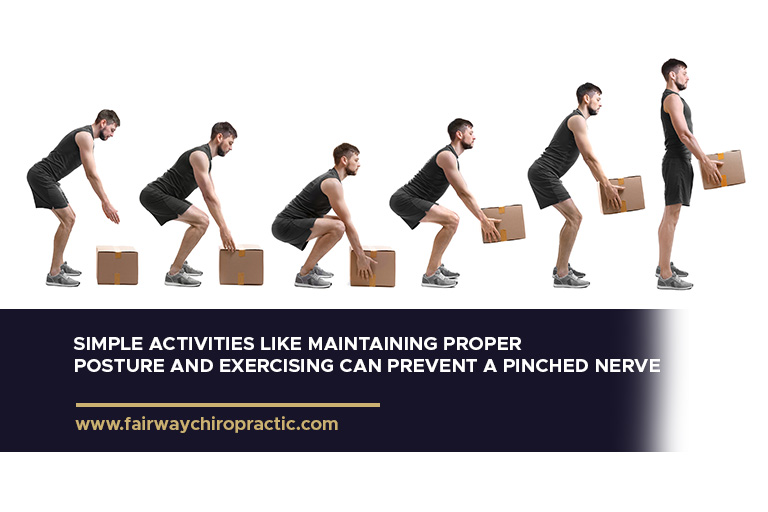Pinched nerves can disrupt daily life with discomfort and pain, making even simple tasks seem daunting. A pinched nerve occurs when too much pressure is applied to a nerve by surrounding tissues. This condition can result in numbness, tingling, weakness, or pain in the affected area. Fortunately, there are various treatments and home remedies that can offer relief. This article explores those methods, providing insights into managing and alleviating pinched nerve pain effectively.
A Quick Look at Pinched Nerves
Pinched nerves occur when excessive pressure is applied to a nerve by surrounding tissues, such as bones, cartilage, tendons, or muscles. This condition can affect various parts of the body, leading to a range of symptoms.
Causes
- Herniated or slipped discs, especially prevalent in cases of a pinched nerve in the neck or cervical pinched nerve
- Bone spurs, which are bony projections that develop along bone edges
- Repetitive motion or overuse injuries, contributing to conditions like carpal tunnel syndrome.
- Obesity, which increases pressure on nerves throughout the body
- Rheumatoid arthritis, which causes inflammation in the joints
- Sports or occupational activities that put repetitive stress on the same body parts
Symptoms
- Numbness or decreased sensation in the area supplied by the nerve
- Sharp, aching, or burning pain, which may radiate outward
- Tingling, pins and needles sensations (paresthesia)
- Muscle weakness in the affected area
- Frequent feeling that a foot or hand has “fallen asleep”
- Pain that radiates down the arm and possibly into the hand, is a specific symptom of a pinched nerve in the neck and shoulder.
Diagnosis
Diagnosing the type of pinched nerve an individual has typically involves a physical exam and a review of medical history. Doctors may perform nerve conduction studies, electromyography (EMG), or imaging tests such as MRI or CT scans to identify the exact location and cause of the nerve compression. These diagnostic tools help differentiate between various types of pinched nerves, which can affect different parts of the body. Experienced Chiropractors can often determine the location of a pinched nerve from a thorough physical examination without the need for medical tests and procedures.
Prevention Tips for a Pinched Nerve

Preventing pinched nerves centers on maintaining overall body health, proper posture, and ergonomics. Key strategies include:
-
Regular Exercise
Strengthening and stretching exercises enhance muscle flexibility and support, safeguarding against nerve compression.
-
Weight Management
Keeping a healthy weight reduces stress on nerves, particularly in weight-bearing areas like the spine.
-
Proper Posture
Adopting correct posture, especially while sitting or working, minimizes undue pressure on the neck and back, preventing issues like a pinched nerve in the neck.
-
Ergonomic Workspaces
Setting up an ergonomic work environment can prevent repetitive strain injuries, crucial for those prone to pinched nerves in the wrist or elbow.
-
Breaks and Movement
Taking regular breaks to move and stretch during long periods of sitting or repetitive work helps maintain muscle flexibility and reduces nerve stress.
Chiropractic Care
Chiropractors use spinal adjustments to relieve pressure on the nervous system, improve spinal alignment, and enhance bodily function. This can be particularly effective for relieving pinched nerves caused by spinal misalignments.
Chiropractic has helped countless individuals with pinched nerves in the neck, mid back, and lower back, eliminating their sciatica, arm/hand pain and numbness and carpal tunnel syndrome symptoms to name a few. As a result, many have been able to avoid injection needles and surgery to reduce their pain.
Home Remedies
Home remedies can offer significant relief from pinched nerve symptoms:
-
Relative Rest
Allowing the affected area to rest and avoiding activities that worsen the pain can help reduce inflammation and pressure on the nerve.
-
Cold Packs
Ice can relieve pain, reduce inflammation and therefore decreasing pressure on the nerve from swelling and improving pain along the path of that nerve. Try 10 minutes every hour on the source of a pinched nerve (neck or lower back for example) even though you feel the pain in your leg or arm.
-
Relief Exercises
If you are suffering from sciatica – you must try this exercise – it has helped so many!
Lifestyle Adjustments
Making lifestyle adjustments is crucial for managing and preventing pinched nerve pain:
-
Healthy Diet
Consuming a diet rich in anti-inflammatory foods can support nerve health and reduce inflammation that may contribute to nerve compression.
-
Stay Active
Regular physical activity keeps the body flexible and strengthens the muscles that support nerve pathways, reducing the risk of pinched nerves.
-
Stress Management
Techniques such as meditation, and deep-breathing exercises can reduce muscle tension that might lead to nerve compression.
-
Quit Smoking
Smoking can impair circulation and increase the risk of disc degeneration, potentially leading to pinched nerves.
-
Proper Lifting Techniques
Using safe lifting techniques prevents undue strain on the back and neck, reducing the risk of pinched nerves.
-
Sleep Posture
Sleeping in a position that supports the spine’s natural curve can prevent unnecessary pressure on the cervical spine, mitigating the risk of developing a pinched nerve in the neck.
-
Ergonomic Adjustments
Advice on ergonomic adjustments at work or home may be provided to help reduce the risk of further nerve compression.
Pinched nerve pain can be debilitating, but with the right approach, relief is achievable. From medical interventions and chiropractic care to home remedies and lifestyle adjustments, various strategies can help manage the symptoms.
For those experiencing chronic pain, seeking professional advice from a chronic pain clinic like Fairway Chiropractic Centre in Kitchener is a wise step. Their expertise in chiropractic treatment for pinched nerves can guide patients toward a pain-free life. Don’t let pain hold you back; start your path to recovery.
Give us a call at 519-748-5535 for a consultation.











